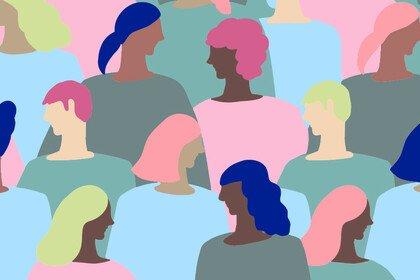
Wellcome’s gender and ethnicity pay gaps
Wellcome reports gender and ethnicity pay gaps at a fixed moment each year. We use the data as an important measure of progress on our equity, diversity and inclusion (EDI) strategy.
Gender pay gap is the difference between the average hourly rates of pay for men and women. Ethnicity pay gap is the difference between the average hourly rates of pay for people from racially minoritised groups and white people.
Comparing average rates of pay reflects broad trends in employment and salaries.
Wellcome's gender pay gap 2024
On 5 April 2024, Wellcome had a gender gap in median pay of 15.7%. This is slightly wider than the UK average, reported as 13.1% in 2024 by the Office for National Statistics (ONS). Our gender gap in mean pay was 22.8%.
Our gender pay gap is mostly a result of the highest-paid roles being held by men, and relatively few men being employed at more junior levels. The variation between 2023 and 2024 is mainly due to the gender split of people joining the organisation at different levels in the year.
Over the past eight years, our gender pay gap has steadily reduced. Since 2017, the gap in mean pay has reduced by 7.2%, and the gap in median pay by 5.1%.
As seen in other UK organisations and ONS data, our gender pay gap appears to be plateauing with relatively small year-on-year variations.
Gender pay gap averages by year (%)
Wellcome's ethnicity pay gap 2024
On 5 April 2024, Wellcome had an ethnicity gap in median pay of 6.6%. Our ethnicity gap in mean pay was 15.1%.
Our ethnicity pay gaps are driven by low representation of people from racially minoritised groups, particularly in senior roles. Both mean and median pay gaps have increased this year, driven mostly by the ethnicity data from new joiners.
Interpretation should be tentative because Wellcome has not received ethnicity data from around 13% of our employees. This is a significant proportion of the workforce, whose data could affect the pay gap calculations considerably.
Ethnicity pay gap averages by year (%)
Source: Wellcome
Line chart showing Wellcome's average ethnicity pay gap by year since we started reporting the data in 2019.
What we're doing to close our pay gaps
In 2024, we have:
- developed new internal guidance on inclusive recruitment
- introduced training on equity, diversity and inclusion, which 92% of staff have completed to date
- launched regular staff pulse surveys to better understand employee experiences
- established a new Equity department led by the Executive Director, Equity (formerly Chief Equity, Diversity and Inclusion Officer), which brings together teams working on equity, diversity and inclusion at Wellcome and in our work
- begun developing an Equity framework that clarifies the rationale for equity, diversity and inclusion at Wellcome and the relationship between science, health and equity as we raise our ambitions for our equity work.
Next steps include:
- continuing to focus during recruitment on diversifying teams that lack people from racially minoritised groups, senior women or junior men and ensuring inclusive practice is followed
- regularly monitoring and analysing internal movement data to identify trends and mitigate bias in decision making
- developing a smoother process for tracking and measuring inclusion and employee experiences through our staff pulse surveys
- incorporating pay gaps into our developing Equity framework, to ensure this work becomes part of the broader effort to address workforce equity.


